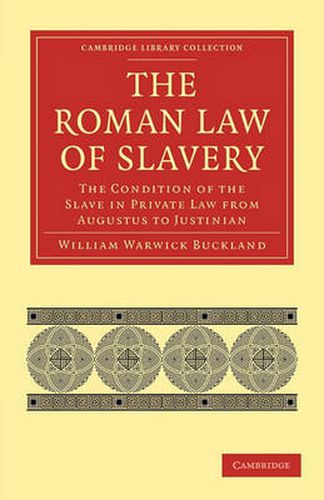Readings Newsletter
Become a Readings Member to make your shopping experience even easier.
Sign in or sign up for free!
You’re not far away from qualifying for FREE standard shipping within Australia
You’ve qualified for FREE standard shipping within Australia
The cart is loading…






W. W. Buckland’s highly regarded magisterial work of 1908 is a scholarly and thorough description of the principles of the Roman law with regard to slavery. Chapters systematically address, in Buckland’s words, ‘the most characteristic part of the most characteristic intellectual product of Rome’. In minute detail, Buckland surveys slaves and the complexity of the position of the slave in Roman law, describing how slaves are treated both as animals and as free men. He begins by outlining the definition of ‘slave’, their characteristics and conditions, giving examples of particular cases and describing for the reader the sorts of work a Roman slave might do. Carefully and comprehensively referenced throughout, this is a general survey of an important aspect of Roman law by a renowned Cambridge academic, which retains its status as an enduring classic.
$9.00 standard shipping within Australia
FREE standard shipping within Australia for orders over $100.00
Express & International shipping calculated at checkout
W. W. Buckland’s highly regarded magisterial work of 1908 is a scholarly and thorough description of the principles of the Roman law with regard to slavery. Chapters systematically address, in Buckland’s words, ‘the most characteristic part of the most characteristic intellectual product of Rome’. In minute detail, Buckland surveys slaves and the complexity of the position of the slave in Roman law, describing how slaves are treated both as animals and as free men. He begins by outlining the definition of ‘slave’, their characteristics and conditions, giving examples of particular cases and describing for the reader the sorts of work a Roman slave might do. Carefully and comprehensively referenced throughout, this is a general survey of an important aspect of Roman law by a renowned Cambridge academic, which retains its status as an enduring classic.